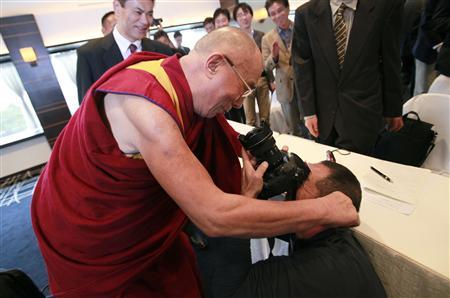Dalai Lama says expects China political reform under Xi

Tibetan spiritual leader the Dalai Lama (L) jokes as he pulls the ears of an photographer after a news conference in Yokohama, south of Tokyo November 5, 2012. China's leader in-waiting, Xi Jinping, will have no choice but to embark on political reforms to leave a lasting mark the way the current leadership has done with economic reforms, exiled Tibetan spiritual leader the Dalai Lama said on Monday.
Credit: Reuters/Yuriko Nakao
YOKOHAMA, Japan |
(Reuters) - China's leader in-waiting, Xi Jinping, will have no choice but to embark on political reforms to leave a lasting mark the way the current leadership has done with economic reforms, exiled Tibetan spiritual leader the Dalai Lama said on Monday.
Xi, currently vice president, is expected to take over from President Hu Jintao as Communist Party head at a congress opening in Beijing on Thursday and will then become president in March in a generational leadership change.
"Now Hu Jintao's era (is the) past, now Xi Jinping is coming as president. I think there's no alternative except some political change, so political reform. Economy reform (is) already there" the Dalai Lama told reporters while on a pastoral visit to Japan.
He acknowledged that economic reforms had produced benefits for China, but said the resort to force by the authorities was at odds with their aim of creating a "harmonious society".
"Using force brings suspicion, fear. That's just opposite of harmony," he said.
Beijing has branded the Dalai Lama a separatist and accused him of inciting protests against Chinese rule in Tibet, including more than 60 self-immolations in and around the region since March 2011. Beijing denounces the self-immolations as acts by terrorists and criminals.
The Dalai Lama denies he is a separatist and says he only wants meaningful autonomy for his Himalayan region. He made no direct comment on the self-immolations or last week's United Nations report that urged China to address deep-rooted frustrations that have led to such desperate forms of protest by Tibetans.
Beijing, however, slammed the report and spared no harsh words for the 77-year-old leader.
"We are strongly opposed to and dissatisfied with the so-called statement on Tibet by the U.N. human rights chief," Chinese Foreign Ministry spokesman Hong Lei said.
"The Dalai clique has seriously beautified the illegal recent self immolations in Tibetan areas, which are extreme behavior in violation of religious mores."
The Dalai Lama said he hoped that if China became more democratic it would help resolve issues with its neighbors, such as a territorial dispute between China and Japan.
Sino-Japanese relations have deteriorated sharply since September, when the Japanese government bought from a private owner some of a group of East China Sea islets that both countries claim, triggering anti-Japan protests across China.
As part of talks between Tokyo and Beijing on the territorial spat, senior foreign ministry officials from both countries met in China on Sunday and Monday and agreed to continue their dialogue.
(Additional reporting by Ben Blanchard in Beijing; Writing by Kiyoshi Takenaka; Editing by Tomasz Janowski and Ron Popeski)
![]()
© Thomson Reuters 2012 All rights reserved